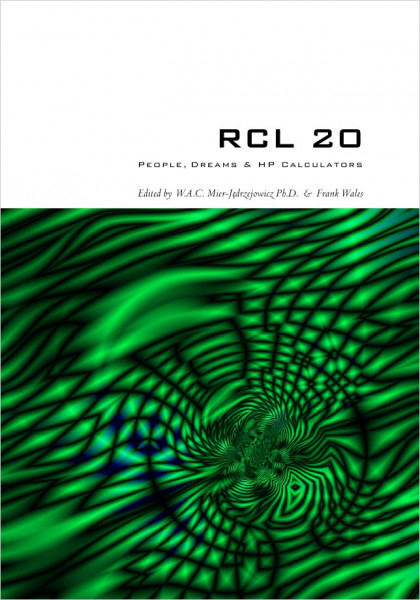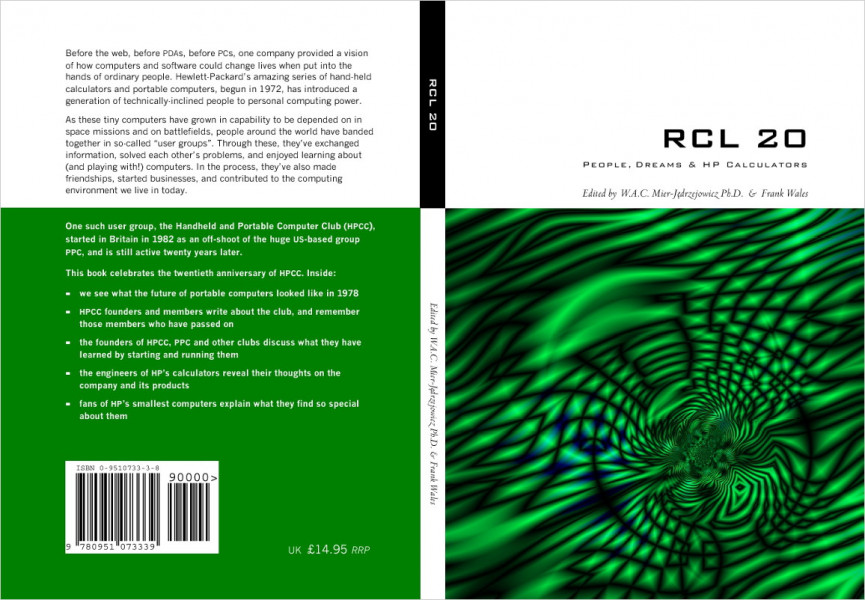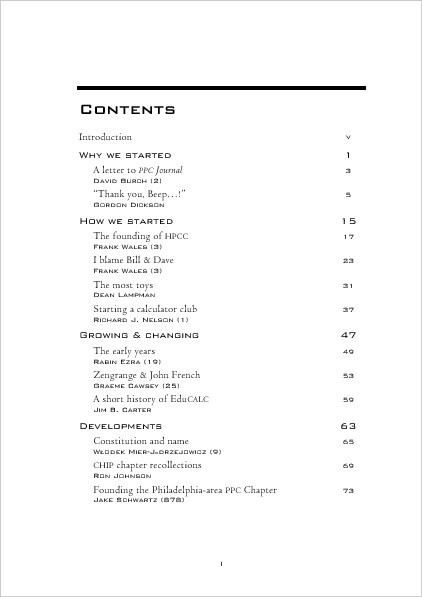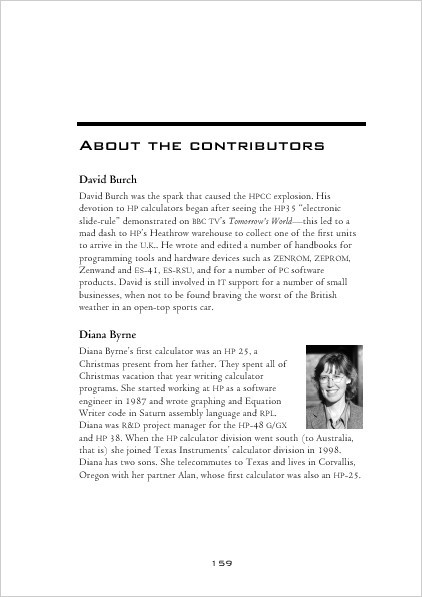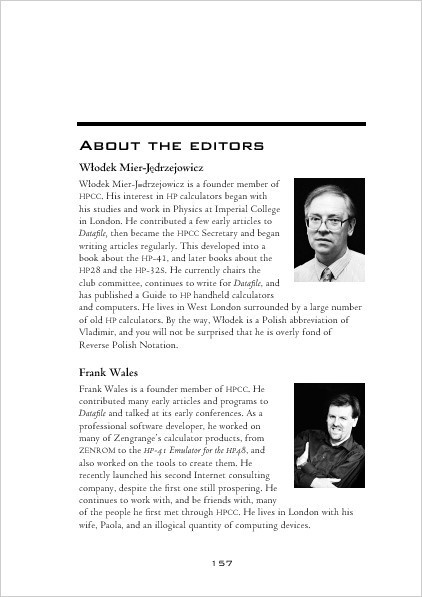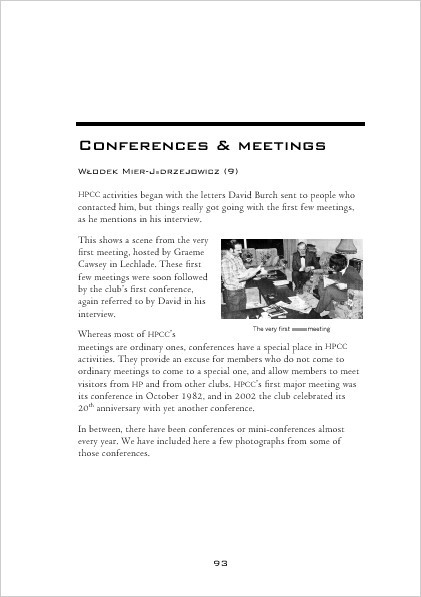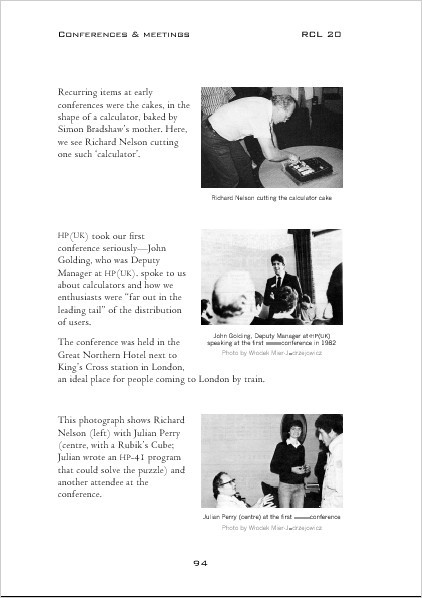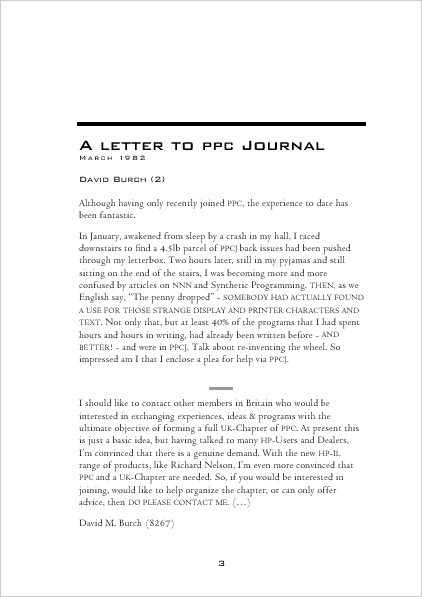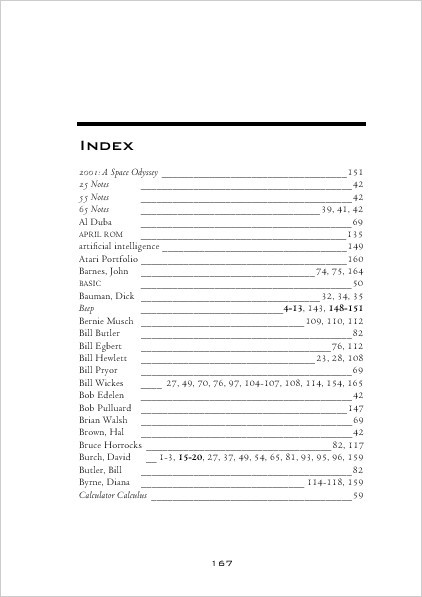| Format |
paperback
|
|---|---|
| Size |
148mm x 121mm
|
| Pages |
190
|
| ISBN |
978-0951073339
|
| Editors |
Frank Wales
Wlodek Mier-Jedrzejowicz
|
| Designer |
Paola Kathuria
|
| Publisher |
Limitless Innovations
|
| Ref |
RCL20
|
Description
Sample chapter
Read a sample chapter by Frank Wales.
About RCL 20
Before the web, before PDAs, before PCs, one company provided a vision of how computers and software could change lives when put into the hands of ordinary people. Hewlett-Packard's amazing series of hand-held calculators and portable computers, begun in 1972, has introduced a generation of technically-inclined people to personal computing power.
As these tiny computers have grown in capability to be depended on in space missions and on battlefields, people around the world have banded together in so-called "user groups". Through these, they've exchanged information, solved each other's problems, and enjoyed learning about (and playing with!) computers. In the process, they've also made friendships, started businesses, and contributed to the computing environment we live in today.
One such user group, the Handheld and Portable Computer Club (HPCC), started in Britain in 1982 as an off-shoot of the huge US-based group PPC, and is still active twenty years later.
This book celebrates the twentieth anniversary of HPCC. Inside:
-
we see what the future of portable computers looked like in 1978
-
HPCC founders and members write about the club, and remember those members who have passed on
-
the founders of HPCC, PPC and other clubs discuss what they have learned by starting and running them
-
the engineers of HP's calculators reveal their thoughts on the company and its products
Introduction
It is a very human thing to set up groups or clubs of people with a common interest. The rise of electronic equipment since the 1960s has provided many new opportunities for such clubs. One topic of interest was personal computing devices, and the first of these were hand-held programmable calculators.
The most successful club for users of these was PPC; this began in California and soon spread all round the world. This book celebrates 20 years of the club that was originally the British section PPC-UK, which later became the Handheld and Portable Computer Club, or HPCC.
Today, the term 'calculator' either conjures up the idea of 'adding machine', or those brightly-coloured devices sold in bubble-packs and intended for school and university mathematics work. But the kinds of calculators that were the focus of our club's attention were the only truly programmable and portable computers available to ordinary people. The programmability was key—it made them little software engines that could be applied to any task, not just mathematics. That they were still called 'calculators' belied their real capabilities—these machines were true portable computers, and are in many ways the ancestors of present-day laptops and PDAs.
This is not a history book; rather, it covers the first 20 years of HPCC through a series of recollections. The editors asked people associated with HPCC, and with HP handheld calculators or computers, for their recollections of those 20 years. That gave the book its title: "recall 20", or RCL 20 as it would appear in a program on an HP calculator.
Wlodek Mier-Jedrzejowicz & Frank Wales
London, U.K.
September 2002
Contributors
-
Diana Byrne
-
David Burch
-
Jim Carter
-
Graeme Cawsey
-
Dave Conklin
-
Jim Donnelly
-
Rabin Ezra
-
Gary Friedman
-
Jordi Hidalgo
-
Ron Johnson
-
Neville Joseph
-
Dean Lampman
-
Wlodek Mier-Jedrzejowicz
-
Richard Nelson
-
John Olwoch
-
Mark Power
-
Jake Schwartz
-
Jeremy Smith
-
Frank Wales
-
Bill Wickes
-
Raan Young
Reviews
RCL 20 is a valid HP-41C instruction, but also stands for the ReCoLlection of the (20 year long) history of the British PPC Chapter, once called PPC-UK and now HPCC, Handheld and Portable Computer Club.
Most of the stories are highly personal and talk about the ways calculators changed our lives.
It is amazing to read the story of your youth written by someone else - Frank Wales' story about choosing profession, Rabin Ezra's story about that amazing feeling you have when you meet other people with the same interests for the first time, Graeme Cawsey's story about ZENROM development when they had to squeeze every possible byte (including double usage of the version number and checksum bytes for the code), Gary Friedman's story about hardware tweaks for overclocking the calculator, Wlodek Mier-Jêdrzejowicz's story about running the club and editing the newsletter...
Quite a few of these things happened to every one of us, only the names are different.
A customer
1972 was a landmark year with the introduction of HP handheld calculators and portable computers. Back then, early programming pioneers (hobbyists, engineers, students, and others) embraced this new pre-PC technology with a vengeance.
These men and women found ways to push pocket calculators like the HP-35, HP-65, and others, to the limit and beyond what their creators had ever thought possible.
RCL 20 (Recall 20) is a warmly-written, collection of articles, stories, personal remembrances, and information of that time and of those wonderful people.
Viktor T. Toth, rskey.org
Technical people are often not very good storytellers. The chapters of 'RCL 20' are a pleasant exception.
You don't have to be a 'calculator nut' ... to understand the incredible excitement that these machines brought to their owners.
Warren Furlow, hp41.org
Any HP calculator fan will find it entertaining and enlightening.
GNU_Ninja
If you're a calculator geek, this is an excellent read :-)
M. Macrae
This book is about people who encountered HP hand-held calculators in the 80-90s.
Not technical stuff, but how they became influential in careers at that time.
A good read if you come from a similar background. Good read if you are into calculator history.

